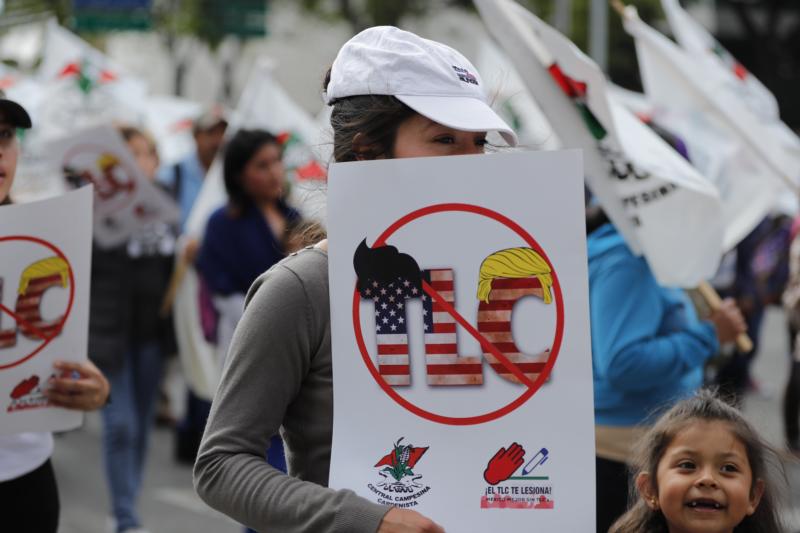
A woman holds a banner against a free trade agreement during a demonstration in late August to protest the start of the North American Free Trade Agreement renegotiations talks in Mexico City. Mexican and American bishops called on negotiators working to overhaul a 23-year-old trade agreement to ensure that any changes keep the needs of poor people foremost. (CNS photo/Jose Mendez, EPA)
WASHINGTON (CNS) — Mexican and American bishops called on negotiators working to overhaul a 23-year-old trade agreement to ensure that any changes keep the needs of poor people foremost.
Any new planks in the North American Free Trade Agreement must be evaluated “in terms of the effects on people and the environment in the affected countries,” said a statement from the leaders of committees focused on justice and peace within both bishops’ conferences.
The statement was released Nov. 21 in Washington and Mexico City as negotiators from the United States, Canada and Mexico were in the third month of meetings on the agreement known as NAFTA.
[hotblock]
“It (the statement) was a matter of lifting a joint voice,” explained Bishop Oscar Cantu of Las Cruces, New Mexico, chairman of the U.S. bishops’ Committee on International Justice and Peace, one of the signatories to the three-page document. “We wanted to remind policymakers that there are moral considerations that must take place.”
Bishop Cantu told Catholic News Service that it was important to bring attention to long-held moral principles found in Catholic social teaching to remind negotiators their primary concern should be for peoples’ livelihoods.
Also signing the statement were Bishop Frank J. Dewane of Venice, Florida, chairman of the U.S. bishops’ Committee on Domestic Justice and Human Development; Bishop Jose Leopoldo Gonzalez Gonzalez of Nogales, Mexico, chairman of the Mexican bishops’ social ministry committee; Archbishop Carlos Garfias Merlo of Morelia, Mexico; and Bishop Guillermo Ortiz Mondragon of Cuautitlan, Mexico.
“The church believes that trade must, first of all, benefit people, in addition to markets and economies. It is crucial that these complex and multifaceted agreements arise from a sound legal and moral framework that protects the common good and the most vulnerable,” the statement said.
The statement offered seven guiding themes and criteria for negotiators that address moral concerns. Specifically, they include avoiding deeper poverty for poor people; alleviating conditions that cause people to migrate for a better life; and protecting worker rights including the number of hours worked, adequate pay and preventing child labor.
[tower]
Other guidelines include prioritizing sustainable development and care for creation; ensuring that indigenous people share equitably in any benefits from trade; easing the vulnerability of small farmers to corporate farming; and adding intellectual property rights provisions regarding pharmaceuticals and agriculture in particular.
The statement encouraged political leaders in the Canada, the U.S. and Mexico, the three countries covered by NAFTA, to deepen bonds among the nations, “taking into account the concerns that have arisen since the implementation of the original agreement.”
The bishops of the United States and Mexico also called for any new agreement to be supplemented by financing mechanisms and additional cooperation in development to ensure social well-being and preventing the deepening of economic inequality between families and regions.
The statement urged he strengthening of human rights protections, including labor standards, and social, cultural and environmental rights in addition to security for people on both sides of the U.S.-Mexican border.
“It’s not that the principles have changed, but to highlight those now,” Bishop Cantu said.
He added that it was important for both bishops’ conferences to speak with one voice on the issue. He cited the St. John Paul II’s 1999 apostolic exhortation “Ecclesia in America” (“The Church in America”) as a guiding force for the cooperation among the bishops.
The exhortation called for unity and cooperation among the churches across the borders of the Western Hemisphere. It followed the fall 1997 special assembly for America of the Synod of Bishops.
When NAFTA came into force Jan. 1, 1994, it was touted as an economic stimulus to the three countries because it lifted trade barriers and would provide much-needed jobs. However, it has come under criticism for causing the erosion of U.S. and Canadian jobs as companies relocated manufacturing facilities to Mexico to take advantage of weaker employment protections, lower wages and less stringent environmental regulations.
President Donald Trump pushed for reopening talks on the trade agreement, saying that the U.S. economy and its workers had not benefited from some provisions. He has threatened to withdraw from NAFTA altogether if, in his determination, a deal is not reached that helps reduce the U.S. trade deficit.
PREVIOUS: Protection urged for nation’s ‘vulnerable,’ especially migrants, refugees
NEXT: ‘Future of church in good hands,’ says Archbishop Gomez at closing Mass



Share this story